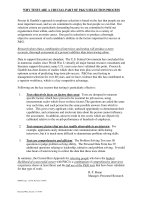INCREASING YOUR CULTURAL INTELLIGENCE
Bạn đang xem bản rút gọn của tài liệu. Xem và tải ngay bản đầy đủ của tài liệu tại đây (5.4 MB, 118 trang )
CHAPTER 6:INCREASING YOUR CULTURAL
INTELLIGENCE
• WEAVING TOGETHER THE STRANDS
1.How do you weave them together to
increase your cultural intelligence?
2.What practical actions can you take to
become a savvier international
professional?
3.What can you do about what you’ve
read, heard about, thought about, and
experiencaed firsthand?
Cultural intelligence involves three components.
Knowledge about Culture (facts and cultural
traits)
+ Awareness ( of yourself and others)
+ Specific Skill (behaviors)
= Cultural Intelligence
First:
- dealing with people who are different from you
on the five basic cultural scales presented in part
1.
- blend a discussion of the nineteen other minor
scales on which you ranked yourself and your
colleagues in part 5.
Then:
-increase your cultural intelligence in three main
areas:
•
Communication skill
•
Practical working know-ledge of a country
•
A framework for considering international
ethics issues.
• Communication skill
- face to face contact
- specifioc behaviors you can put into practice
• Practical working know-ledge of a country
- necessarily more abstract or conceptual
- reaserching your target country and explain why it’s the right
direction
- find relevant, specific information
• Framework
- engaged in international business at home or aboard, in
diplomacy, or in serving diverse populations within your own
culture
- the bottom of the iceberg values, beliefs, attitudes, and
philosophies dis-cussed in part 1.
INTERCULTURAL COMMUNICATIONS
Name: Nguyễn Phương Linh
Student ID: 15140048
Dealing with Diferences in the Five Scales
Give you:
A better understanding of the directions in
which cultural differences are likely to lie
between you and your international
counterparts.
An initial idea of what to watch for in your
interactions with people whose cultural
orientation is on the opposite side of the scale
from your own.
EQUALITY VERSUS
HIERARCHY
If you are dealing with people more
focused on equality than you, the
following advice applies:
Have less of a hands-on
management style and that you
sometimes allow employees to
complete tasks without heavy
intervention from you.
Express your opinions confidently
even if you do not have positional
power.
If you are dealing with people more
focused on hierarchy than you, these
suggestions apply:
• Recognize that men and women man play
distinct social and work roles
• Changing someone else’s entire society, learn
the different roles people play and honor
them within the boundaries of that society
• Learn which person can accomplish the task
you want taken care of
• In hierarchy-focused cultures, people may
not have the same social flexibility or
mobility you are accustomed to, but they are
more likely to have a clear identity.
CULTURAL INTELLIGENCE
Presenter:Lam Gia My
Student id:15010055
Direct versus indirect
• If you are dealing with people who prefer to be more direct
than you: try to say what you mean concisely and directly.
It”s usually quite acceptable to say “No” or “I cant”
• Focus on more what is said than how it is said
• Many direct culture emphasize the written word and
contracts. Legal contract are not merely symbolic and they
don’t imply mistrust ,they should be treated seriouly
• Expect some conficts to be dealt with more openly
than you may be accustomed to.this should mean a
loss of face for you.
• To people from indirect cultures silence may mean
disagreement or reluctance or simply thoughtful
respect,but to people from direct culture silence mean
nothing.
• People from direct cultures are
often linears thinkers and they may
become impatient if you don’t
quickly get “straight to the point”
• If you are dealing with people who prefer indirect
than you:be prepared more tact than usual. Be
mightful of how you say things,not just what you
say. Also pay attention to what is not said,and watch
for nonverbal clues.
• Noctice and then try to use the formalities,protocols
and appropriate diplomatic and respectful language
people employ when speaking.
• Be very cautious about raising diifficult topics or
resolving sensitive issues.
• Be especially mindful not to be overly direct in
situations involving conflict.
• Indirect people can be circular thinkers and generally
don’t like to jump straight to the point. You may need
to resist the urge to push the conversation or meeting
in order to get your indirect colleagues to state a point
directly
Individual versus group
• If you are dealing with people who have a more individual
focus than you:
• You may need to be more independently resourceful and
take individual initiative in new way. The goal of the team
may be the most important,but you may be expected to
focus more on your individual performance and what you
contribute individally.
• In individually focused cultures,command or
collaborative decision making styles are more
common than the consensus style. Be prepared to
make decisions on your own in situations where
you might normally consult with your superior or
include your team
• Employee are often motivated by personal
incentives and expect to be rewarded similary. A
personal reward for” employee of a month” or
“top salesperson” may motivate people more than
impersonal group reward such as”best sale team”
If you are dealing with people who who are goup
focused than you:Be mindful of group goal,group
performance,and generally place the group before
yourself,remember,your own individual initiative
is not the best way to demonstrate your value as
an employee.
• While people from individuaalistic cultures may
prefer personalized reward systems,people from
group oriented culture often feel akward when
singled out like this,because the team performance
may be more importance.one person will not be
comfortable taking all the recognititon . Find way
to to recognize the group’s performance,not what
an inividual has contributed to the group









